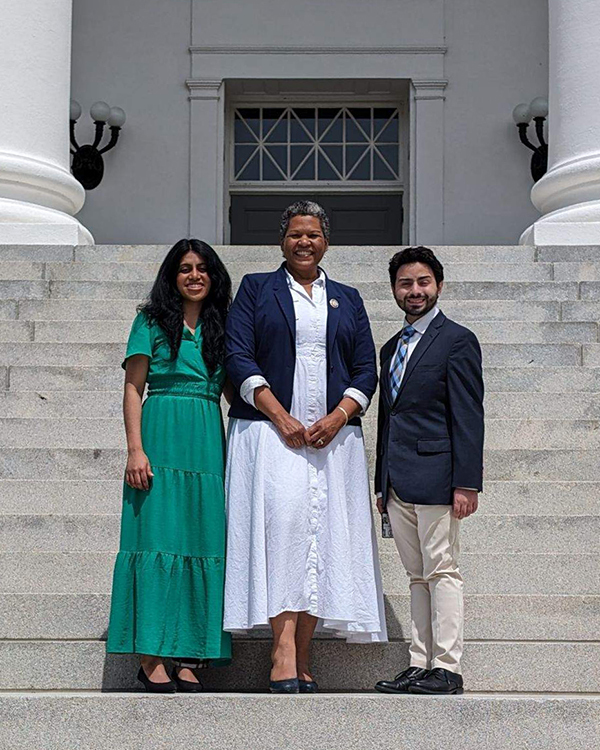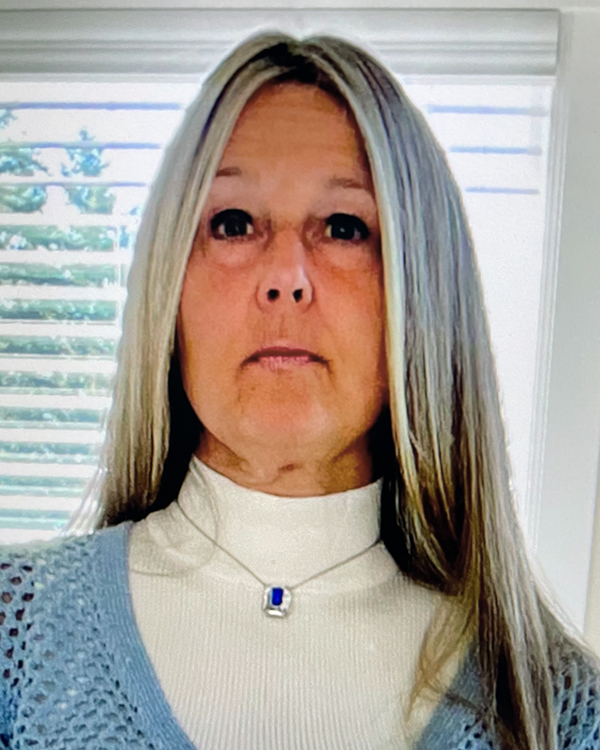Advocacy
If wire fraud and elder financial exploitation can happen to lawyers, doctors, dentists, veterans, professors, and an educated, decorated, retired nuclear submarine commander and Navy consultant, then it can happen to you. Let's strive for federal protections in financial services.
Online phishing scams are getting more sophisticated, and the advent of artificial intelligence is likely to make them more numerous and harder to detect. The American population is also aging: the number of Americans aged 65 and older will top roughly 80 million by 2040.
The average dollar loss per victim in the state of Virginia was nearly $38,000 in 2023. Yet the emotional toll can be even greater. The trauma, shame, and humiliation associated with being scammed are burdens no one should have to bear.
The figures the FBI reports are likely just the tip of the iceberg. A report from the National Adult Protective Services Association estimates that only one in 44 cases of elder financial abuse is ever reported.
A report from the Consumer Financial Protection Bureau recommends that banks use technology to better protect their customers. The CFPB also recommends that banks using predictive analytics — a technology that uses artificial intelligence to identify suspicious activity based on account holders’ patterns of behavior — review their filtering criteria to incorporate all possible risk factors for elder financial exploitation.
However, these scammers are unlikely to ever be stopped solely by technological countermeasures. Progress in fighting them requires human vigilance at known points of detectability. This is why I write to you today. In the case of my Uncle Larry, both his bank and Adult Protective Services were aware that Larry was a suspected victim of elder financial exploitation, but yet this awareness resulted in nothing to stop the 74 international wires Larry sent.
What our seniors need most is better preventive legislation.
Two glaring gaps in banking regulatory policy are abetting those seeking to scam the elderly. Whereas the Financial Industry Regulatory Authority requires brokerage firms to ask customers to identify a “trusted contact” in case of suspicious account activity — allowing quick intervention and verification in case of suspicious transactions — banks and credit unions don’t operate under a similar national requirement. Furthermore, whether or not bank employees are mandated reporters for suspected elder abuse varies by state. In Virginia, banks are not mandated reporters.
These issues aren’t limited to Navy Federal Credit Union. Last year, federal regulators fined USAA Federal Savings Bank $140 million for failing to monitor suspicious activity on customers’ accounts. Last month, the Consumer Financial Protection Bureau required Citizens Bank pay a $9 million penalty for failing to manage and respond to customers’ fraud claims and credit card disputes.

By requiring that banks ask their customers to set up a trusted contact and by mandating that banks across the country report suspicions of fraud to appropriate authorities, we can better protect ourselves and our loved ones from falling victim to fraud.
A dedicated stream of federal funding for Adult Protective Services can help these agencies operate with more consistency from state to state and better intervene, especially when individuals are embarrassed or unaware that they were being scammed.
We need legislation mandating the following policy fixes to help curb the epidemic of elder financial exploitation:
1.
2.
3.
We must protect the elderly from falling victim to increasingly prevalent and complex scams.

Thank you Virginia Delegate Michelle Maldonado, Alexander Cintron (Chief of Staff), and Anika Rahman (Legislative Director).
After his passing, Larry’s legacy of service lives on through his Estate’s collaboration with Virginia Delegate Michelle Maldonado and her team. In February 2024, the Virginia General Assembly passed House Bill 692, also known as “Larry’s Law,” with no dissenters.
The measure lays the groundwork for financial institutions to train their employees in how to identify potential financial exploitation of senior citizens and report suspected financial exploitation of a senior to the authorities. It also permits them to notify a trusted contact of such exploitation and directs the Bureau of Financial Institutions of the Virginia State Corporation Commission to establish training guidelines for detecting and preventing elder financial exploitation of vulnerable adults.
The growing prevalence of financial fraud, both international and domestic, underscores the urgent need for changes in laws and regulations to establish robust financial services protections to prevent exploitation.
These safeguards are essential for protecting both financial institutions and their customers from unusual and potentially fraudulent activities. For financial institutions, these protections help preserve trust, ensure regulatory compliance, and mitigate the risk of financial losses from fraudulent transactions. For customers, these measures secure their personal and financial information, provide peace of mind, and protect their assets from unauthorized access, withdrawals, distribution, and exploitation.
By implementing stringent AI protocols, continuous monitoring systems, and comprehensive training certifications and regulatory requirements, financial institutions can proactively detect and prevent fraudulent activities, thereby fostering a safer and more secure banking environment for all stakeholders.
The Estate will continue to advocate for significant legislative reforms throughout the United States to compel regulators and financial services to address the realities of elder financial exploitation, banking and wire fraud. The Estate asserts that laws must keep pace with the sophistication of national, international cyber criminals, and transnational cybercrime, emphasizing that we are all potential victims without updated regulations and laws.
The proposed changes include:
1) Enactment of laws and regulations requiring mandatory utilization of AI-powered fraud detection and prevention software to analyze transaction data and detect anomalies to identify suspicious wire activity, prior to authorizing wire transfers. Any outgoing wire transfers, flagged by AI software as suspicious or fraudulent activity, would not be released by the financial institution unless the bank initiated a dual control override. Dual control override would require approval by two staff members to initiate, approve, and release any AI flagged wire transfers.
2) Establishing a certification program for all financial services employees involved in domestic and international money wiring.
3) Advocating for the enactment of protections for banks, credit unions, and financial services institutions to not move money when unusual or potentially fraudulent wire activity is detected to protect the account holder. Additionally, proposing changes to the law (U.C.C. Article 4A) to shield these banks, credit unions, and financial services institutions from lawsuits when withholding funds under these circumstances will further enhance the security and integrity of wire transactions.
Addressing and Reporting Financial Exploitation of Senior and Vulnerable Adult Investors via FINRAA
FINRA Rule 2165: Temporary Holds
- Provides a safe harbor from FINRA Rules 2010, 2150, and 11870 when firms
temporarily hold transactions or disbursements in situations involving a reasonable
belief of financial exploitation of a “specified adult” customer. - Specified adults include a person age 65+ or a person age 18+ who the member
reasonably believes has a mental or physical impairment that renders the individual
unable to protect his/her interests. - Requirements:
- Notify within two business days all parties authorized to transact on the account and the
Trusted Contact. - Immediately initiate an internal review.
- Expires in 15 business days, though firm can extend another 10 days, and further if requested
by a court or state agency. - Other requirements relating to recordkeeping and compliance.
- Notify within two business days all parties authorized to transact on the account and the
State “Report and Hold” Statutes
In addition to requirements relating to elder abuse in state APS laws, many states have provisions
addressing senior and vulnerable adult financial exploitation in their securities laws:
- Required or permissive reporting to the state securities administrator, in addition to APS,
and/or other agencies.- Good faith reporting based on reasonable belief that exploitation has occurred or is occurring triggers immunity from civil and administrative liability.
- Requirements governing temporary holds of suspicious disbursements or transactions.
- Requirements governing third-party disclosures.
- Required training provisions.
- Holds are allowed only when the firm confronts:
- A senior or vulnerable adult investor and
- Exploitation.
- These statutes do not provide immunity for placing a hold due to concerns about diminished
capacity, when there is no concern about financial exploitation.
4) Allocating funds from banks to support Adult Protective Services, as they are underfunded despite being more effective in combating exploitation. Funds should be allocated from banks, credit unions, and financial services to support Adult Protective Services (APS) in the handling of all cases related to wire fraud and financial exploitation.
5) Ensuring financial and legal accountability of financial services, banking and credit union institutions for wire fraud, akin to measures in place for credit/debit card fraud.
6) Federal enactment of Virginia Delegate Michelle Maldonado’s H.B. 692, “Larry’s Law”, which is designed to create uniform training guidelines for spotting and reporting financial abuse and exploitation, while giving banks broader legal protection should they be accused of sharing private information in the pursuit of protecting a customer. This measure encourages banks to not just contact a trusted person listed on a customer’s account if they suspect financial exploitation, but also to potentially reach out to another relative with their concerns if all else fails. In exchange, banks and credit unions that undergo this training won't be held civilly liable for disclosing their concerns to the proper people and authorities.
When APS identifies an instance of adult financial exploitation and notifies the bank, credit union, or financial services institution, they are required to stop the movement of all funds. Banks, credit unions, and financial services that authorize movement of funds or wire transfers following an alert by APS will be held responsible for any resulting financial losses. This would require new legislation to protect both the APS, banks, credit unions, and financial institutions from risk. To effectively fulfill this critical role, APS must receive additional funding and resources.
Elizabeth Warren once said that banking should be boring, a sentiment that underscores the necessity for financial institutions to prioritize the security of their citizens over risky ventures. Larry’s lifelong commitment to protect and serve is a call to action, urging us to bring about significant changes in financial regulations, anti-money laundering laws, laws governing financial wire transfers, and the much-needed amendments to U.C.C. Article 4A. Just as the Patriot Act mandates a high level of commitment to national security, banks should exhibit the same unwavering dedication to their customers’ financial safety, just as Larry served his country. By heeding this call, we can ensure that banks, credit unions, and financial services institutions fulfill their fundamental duty of protecting all clients from fraudulent activity, securing a safer financial future for all.


Janine Williamson, Administrator, and one of the five surviving next of kin of Larry W Cook, who collectively, on behalf of the estate, have agree to pursue change. Williamson is a 33-year bank affiliated series seven licensed FINRA member, Private Client Wealth Advisor, and an ACAMS Certified Anti Money Laundering Specialist. Williamson testified on behalf of Virginia’s House bill 692, sponsored by Delegate Michelle Maldonaldo, which passed in the Virginia General Assembly.
The Estate will relentlessly seek wire law changes in order to protect our elderly, vulnerable adults from cybercrime and financial exploitation.

